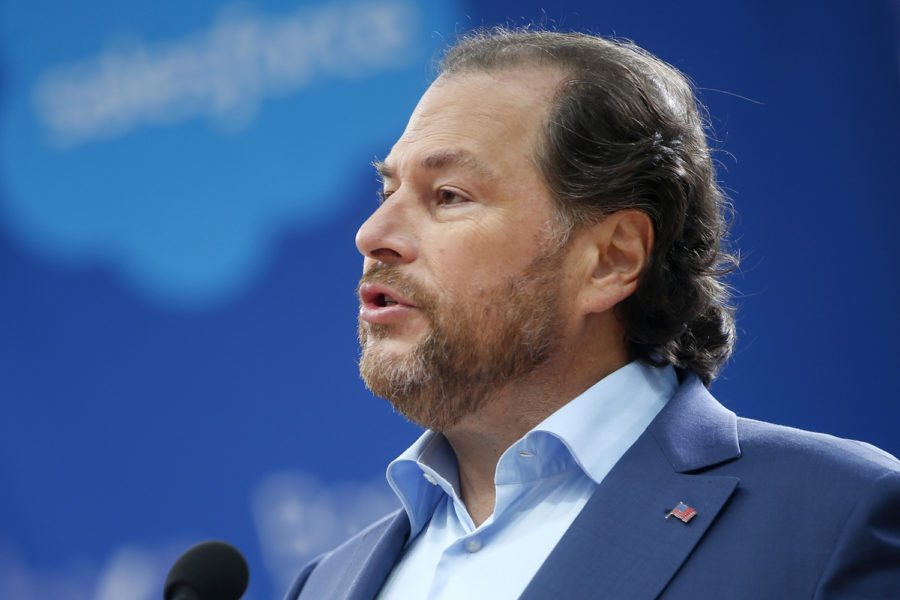Editorial: Boundaries necessary when billionaires buy newspapers
Chris Urso/Tampa Bay Times/TNS
Salesforce founder and CEO Marc Benioff speaks during the grand opening of the Salesforce Tower, the tallest building in San Francisco, on May 22.
September 18, 2018
Another tech mogul recently entered what is becoming an elite club of billionaires buying newspapers and news publications. Salesforce CEO Marc Benioff and wife Lynne Benioff purchased the Time magazine from Meredith Corp. for $190 million with personal funds, according to a Meredith Corp. announcement Sunday.
This growing trend of the rich buying publications in financial difficulty seems necessary for the continuation of print media, but it should still spark some concern for the newspaper industry. It raises the ethical questions of how to prevent billionaires from influencing the content published by their papers, and what kind of relationship the editorial section and the new owner should set up to ensure there is no such influence.
A decrease in advertising revenue has posed a financial problem for many small newspapers, and billionaires can be a godsend in keeping these papers alive. Warren Buffett, for example, has purchased more than 30 struggling local papers and has kept them afloat. However, it’s not just smaller papers that the wealthy are snapping up — larger papers are also being bought by tech giants as well.
Amazon CEO Jeff Bezos purchased The Washington Post in 2013 for $250 million after accepting the first offer former owner Don Graham made. He made it clear from the start that he was interested in increasing the Post’s ad revenue by expanding its online presence, which would not involve him in the editorial process at all.
In fact, when the Post published articles that criticized Amazon Key — a plan to allow Amazon to unlock customers’ doors — and called Amazon a dangerous monopoly, Bezos kept quiet. At a 2017 dinner for Columbia University’s Knight-Bagehot journalism fellowship, Executive editor Martin Baron said of Bezos’s response to articles that criticized him, “I haven’t heard one word from him about any of that, not one word.”
This is the model that all billionaires looking to buy a newspaper should follow, but it’s not one that everyone has followed in the past. Doug Manchester — a developer and President Donald Trump’s pick for ambassador to the Bahamas — bought The San Diego Union-Tribune in 2011 for $100 million and faced criticism for influencing the contents of the opinions section to lean more heavily conservative than in the past.
Newspapers bought by the wealthy should operate separate from the whims of their owners, be that a liberal or conservative lean. This kind of hands-off relationship between an owner and the editorial staff needs to come from efforts by both parties to draw strong boundaries.
Ideally, buyers would come to the table with the expectation that they will have nothing to do with the editorial process. Rather than attempt to influence output, they should content themselves with the knowledge that they’re helping maintain an important part of our democracy.
However, the editorial staff also has an obligation to protect its own interests. One way of doing this could be for those involved in the selling process to set up clear, contractual restrictions prior to the sale that define the necessary boundaries between owner and editorial staff, and request an internal review be conducted every few years to ensure the key values of the paper remain unaffected.
Those terms should be made clear to writers and readers as well so there is no ambiguity as to the role of the owner in the publication. Bezos’ public letter to Post employees shortly after he bought the publication, asserting that journalistic integrity would still be respected, is an example of a reassurance that all new owners of a paper should issue.
If tech billionaires are the future of American newspapers, there needs to be clear restrictions on what they can and can’t do within their publication. And the less influence they have on papers’ content, the better our democracy can function.








